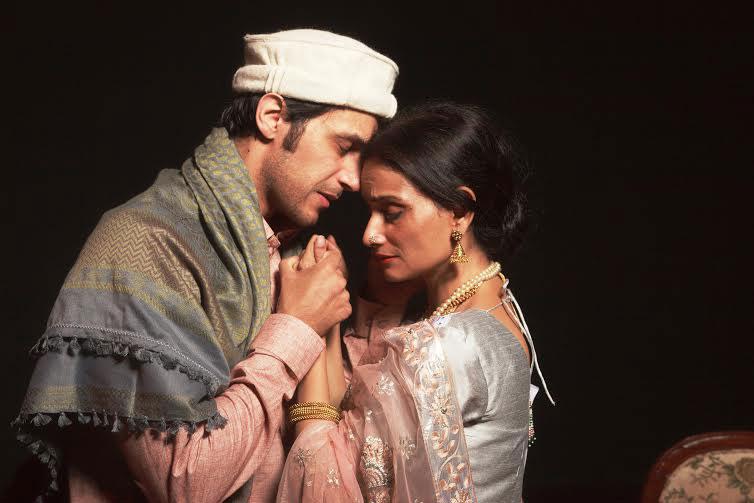 Image
Image
Gauhar, the path-breaker
Gauhar, a play, was recently staged in Kolkata organised jointly by Master Minds Theatre and Weavers Studio, Kolkata, bringing alive the history of recorded music in India on the one hand, and the story of a woman whose life seems like pages out of a film script. Shoma A. Chatterji reports
Gauhar Jaan, one of first mass media superstars at the turn of the last century, sang in 20 languages and cut over 600 records. She is a part of India’s recording history during the British rule. Gauhar, the play directed by Lilette Dubey, recounts her fascinating personal and professional journey. Though Gauhar initially felt, as the play shows, that recording one’s voice on a machine and then played back for listeners was blasphemous to music, she later relented..jpg)
The play is the work of award winning playwright Mahesh Dattani who has adapted it from Vikram Sampath’s –My Name is Gauhar Jaan – Life and Times of a Musician,. Dattani suggested to Dubey that she direct Gauhar, a woman who lived life on her own terms be it her music, her love life, or the enormous wealth she had acquired but who died penniless.
Gauhar Jaan was not Muslim by birth. She was born Angelina Yeoward in 1873 in Patna to William Robert Yeoward, an Armenian Jew, who was an engineer in Azamgarh and Allen Victoria Hemming, a Jewish Armenian lady. Victoria was born and brought up in India, and trained in music and dance. The marriage ended in 1879 when Angelina was six. Trapped in a no-exit situation of social ostracism and financial distress, mother and daughter migrated to Banaras in 1881 with Khursheed, a Muslim nobleman who loved Victoria's music. Later, Victoria converted to Islam and changed Angelina's name to ‘Gauhar Jaan’ and hers to ‘Malka Jaan.’
In 1902, Gauhar Jaan was asked by the Gramophone Company to record a series of songs for them. She was paid three thousand rupees per recording, an exorbitant sum at that time. From 1902 to 1920 she recorded over 600 songs in more than ten languages. She became India' s first recording star. You can still hear her thumris on YouTube where the name of the raga was carried on the label of the 78 rpm record and the singer had to end her song with her name. The play has an amusing minute when the younger Gauhar, after recording a song into the conical microphone, tells the would-be listeners, “I hope you like the song.” Over the years, she developed a love-hate relationship with F. W. Gainsberg of the Gramophone Company which, however, remained professional. Denzil Smith gives a wonderful account of himself both as Gainsberg and Angelina’s father in the play.
.jpg) Gauhar travelled through the country singing songs in the language of the region – Tamil, Gujarati, Bengali and so on where the audience keeps cheering are essayed beautifully. The play, a bit too long for a musical at two-hour-fifteen-
Gauhar travelled through the country singing songs in the language of the region – Tamil, Gujarati, Bengali and so on where the audience keeps cheering are essayed beautifully. The play, a bit too long for a musical at two-hour-fifteen-
Dubey has used two different actors to portray Gauhar- the younger Gauhar and the older one. This offers a multi-layered perspective on both the musical success and personal tragedy of Gauhar’s life. She has chosen Rajeshwari Sachdev, a familiar face on television and occasionally on the large screen to portray the younger Gauhar and Zila Khan, a trained classical singer who has never acted, to portray the older version.
Both Rajeshwari and Zila Singh carry themselves with great poise and dignity despite their social positioning as atawaif courted by Maharajas and zamindars but shunned by mainstream society. The way Rajeshwari emerges as actress-dancer-singer getting under the skin of another singer-dancer of a different time and space considering that she had never even heard of Gauhar Jaan when Dubey first asked her if she would do the title role is amazing. “I was ashamed of my own ignorance and immediately began to set it right by beginning to read Sampath’s book on Gauhar Jaan which she found “one of the most well-researched books I have read.”
Zila Khan, incidentally, is Ustad Vilayat Khan’s daughter. Rajeshwari on the other hand is an actress known for her versatile performances in some Shyam Benegal films and though she can sing well she is certainly not a trained singer. Yet, she equips herself well and sounds convincing in this rich musical play.
Piya Benegal’s costumes highlight the ‘period’ ambience of the play.
The single-set stage is flexible and fluid to change instantly into a courtroom where Gauhar is forced to fight a case claiming her legitimacy from her own father who agrees in exchange of a handsome sum. The play has an open ending beautifully choreographed with the two actresses on stage. Gauhar died in 1930 at a relatively young age dying a sad death. Yet Gauhar is touched with a spirit of optimism, of wanting to be loved and of wanting to live.
Top Headlines
-
Entertainment
Bollywood 2025: Hits, Hype and Heartbreaks as Dhurandhar Redefines the Year
December 24, 2025
-
Entertainment
Rotary Club of Calcutta East Central celebrates centenary of iconic actor Santosh Dutta with statue unveiling
December 04, 2025
-
Entertainment
Valentyn Vasyanovychs To The Victory! wins 2025 TIFF Platform Award unanimously
September 26, 2025
-
Entertainment
Chlo Zhaos Hamnet Wins TIFF 2025 Peoples Choice Award
September 20, 2025
-
Entertainment
Sholay: Golden even after fifty years
July 04, 2025
-
Entertainment
War 2: Check out Hrithik Roshan, Jr NTR and Kiara Advani's new posters
June 26, 2025
-
Entertainment
LGBTQIA+: Icelandic film Odd Fish and Brazil's Baby win big at KASHISH 2025 film festival
June 12, 2025
-
Entertainment
Katrina Kaif named Maldives tourism global brand ambassador ahead of Modi's visit
June 10, 2025
-
Entertainment
'Queen marches to conquer': Deepika Padukone joins Atlee's AA22xA6 starring Allu Arjun after 'Spirit' exit
June 08, 2025
-
Entertainment
Dakota Johnson and Chris Martin, who were in on-and-off relationship, broke up: Reports
June 06, 2025


